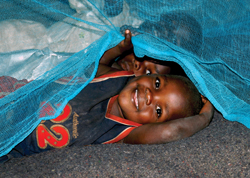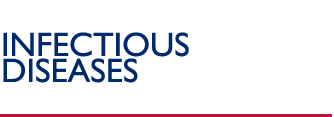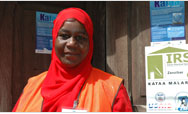Overview
Reducing the Threat of Infectious Diseases
| |
This is a slide show for World Water Day which is March 22, 2009. Each photo is of a child washing their hands with soap or getting clean water from different countries around the world.
 |
| |
April 25th marks World Malaria Day, when countries around the world come together to help raise global awareness of malaria, celebrate progress, and reaffirm their commitment to fighting the disease. Learn more about World Malaria Day 2009.
Source: Gilbert Awekofua, Courtesy of Photoshare |
Read a Statement by President Obama on the Global Health Initiative - 05/05/09
For decades, the U.S. Agency
for International Development (USAID) has been
a leader in the control and prevention of infectious
diseases as part of long-standing efforts in child
survival, maternal
health, and HIV/AIDS.
To further strengthen USAID's ability to respond
to the increasing threat of new and re-emerging
infectious diseases, the Agency launched an infectious
disease initiative [PDF, 193KB] in 1998 with
the support of the U.S. Congress. The initiative
focuses on preventing diseases, such as malaria
and tuberculosis, while simultaneously strengthening
the treatment and control programs that exist
in the health care system and focusing on cross-cutting
issues of building surveillance capacity and
addressing antimicrobial resistance.
This initiative builds on USAID's long-standing efforts to address acute
respiratory infections, diarrheal diseases, vaccine-preventable diseases
(including polio), and malaria in children. Through USAID, the U.S. Government
is the world's largest donor of global health aid, supporting activities in developing countries
for the control, prevention, and mitigation of the HIV/AIDS epidemic.
USAID's infectious disease
initiative targets a number of key priority areas:
- Development and implementation
of strategies and interventions to understand,
contain, and respond to the development and
spread of antimicrobial
resistance
- Sustainable reduction
in incidence of tuberculosis among
key populations in selected countries
- Sustainable reduction
of deaths due to malaria and
incidence of other infectious diseases of
major public health importance among key
populations in selected countries
- Treatment, control, and in some cases, elimination of the seven neglected tropical diseases that can be targeted by providing safe and effective drug treatments to individuals in affected communities.
- Improvement in the
capacity of selected countries to obtain
and use good quality data for surveillance and
effective response to infectious diseases
USAID's Infectious Diseases Programs
|


